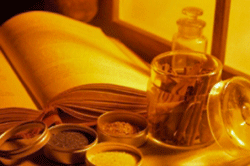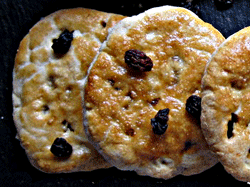Lancashire Wake Cakes
“Wakes” began in the middle ages and were originally a religious festival when the church held a feast of dedication. Many parish churches are dedicated to saints whose feast day falls during June. Indeed Lynsted church’s dedicated saints, Peter and Paul, share the 29 June. An all night vigil would be held in the church followed by a 'rushbearing' festival when all the old rushes that were used as flooring were replaced. The rest of the day was then a holiday. Special foods were made for the celebrations and each region had its own recipes. Sweet food was a luxury and so was reserved as a treat for festival days.
Rushbearing still takes place in some areas and it also gave rise to the custom of Morris dancing, when dancers became a part of the procession that followed the rushes to the church. The traditional “wakes holiday” continued predominantly in Lancashire and Yorkshire when due to absenteeism around the time of this event mill owners decided that they might as well close their factories down at this time to allow them to service the machinery.
Ingredients - Makes approx 10
| 8oz (225g) plain flour |
2 tablespoons milk |
| Pinch of salt |
3oz (75g) mixed dried fruit |
| 6oz (175g) butter |
1 egg, beaten |
| 1oz (25g) caster sugar |
Extra caster sugar for sprinkling |
Method
- Preheat oven to 180°C/350°F/Gas Mark 4 and butter a large baking tray.
- Sift the flour and salt into a mixing bowl and rub in the butter until the mixture resembles breadcrumbs.
- Stir in the sugar and dried fruit.
- Add the beaten egg and mix to a soft dough, adding the milk as necessary.
- Knead lightly and roll out to ¼” (6mm) thick.
- Using a 3½” (9cm) pastry cutter, cut out rounds and place on the baking tray.
- Bake for 20 mins, or until golden brown.
- Remove from the oven and sprinkle with caster sugar.
These are best eaten as fresh as possible.

